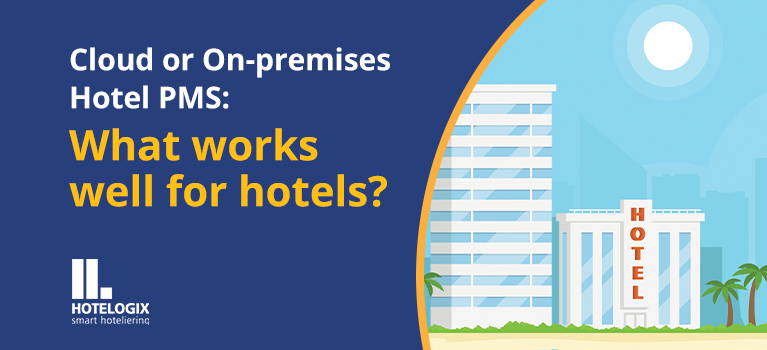

The inception of the Hotel Property Management System occurred during the 1970s. Throughout the following decades, these on-premises solutions, despite their limited functionalities, aided hotels in overseeing front and back-office operations. However, over the span of forty years, from 1970 to 2010, the system underwent only minor advancements, failing to accommodate the evolving demands of hotels. Notably, it struggled to facilitate online room sales. The paradigm shifted in 2010 with the emergence of cloud computing. This marked the rise of cloud-based Hotel PMS, revolutionizing the way hotels embraced technology for comprehensive operational management. Today, we underscore the significance of this transformation – the cloud stands as the ultimate tool driving the holistic success of hotels.
Cost Savings
In the traditional on-premises model, hotels faced substantial upfront costs in the form of long-term licensing fees. Conversely, cloud-based PMS entails a subscription fee structure. Hotels possess the flexibility to pause subscriptions for specific durations. Consider a scenario where a 50-room hotel intends to renovate 10 rooms over a month. In this case, the hotel would only be charged for the 40 operational rooms during that period.
Furthermore, on-premises PMS necessitates additional investment in cybersecurity protocols to safeguard operational and guest data. Contrastingly, cloud PMS relies on cloud hosting, employing robust encryption to shield data, accounts, and workloads from unauthorized access.
The cloud's prowess eliminates the need for costly Annual Maintenance Costs (AMC) associated with on-premises applications. Additionally, on-premises PMS obliges hotels to invest in local servers, hardware, and IT teams. Embracing a cloud PMS obviates the requirement for expensive servers and hardware, effectively obliterating the need for an in-house IT team.
Expedited Implementation and Seamless Upgrades
Implementing an on-premises PMS can be a time-consuming endeavor due to the need for server installations. For instance, the installation process might span 15 to 20 days for a 50-room property. This delay hampers a hotel's swift transition to active operation and revenue generation. Introducing new product features within the on-premises model involves protracted development cycles, limiting a hotel's capacity to optimize its IT investments. Additionally, these upgrades come at an additional cost.
In stark contrast, a cloud-based PMS, characterized by heightened scalability and adaptability, can be deployed within approximately 48 hours for a 50-room property. This expedites a hotel's time-to-market trajectory. Cloud PMS providers possess the requisite computing flexibility to frequently develop and release product upgrades. Furthermore, these upgrades are furnished free of charge, delivering enhanced cost efficiency.
Enhanced Staff Performance
On-premises Hotel PMS relies on a local server situated at the property, necessitating physical presence for access. However, this design clashes with the contemporary emphasis on flexibility, agility, and simplified operational management in the era of mobility.
Conversely, a cloud-based PMS grants users access via mobile devices and web interfaces, enabling seamless execution of daily operations while affording remote oversight of the hotel's status. This augmentation substantially bolsters overall staff performance and productivity.
Amplified Sales Potential
Amidst the surging prevalence of online reservations via Online Travel Agencies (OTAs) and hotel websites, the imperative to enhance online sales intensifies. However, the on-premises PMS model falls short in fostering increased online bookings. It lacks integration with cloud-based channel managers, which play a pivotal role in automating rate and inventory updates on OTAs. Similarly, the web booking engine on the hotel's website faces similar constraints, impeding direct bookings.
In stark contrast, a cloud-based Hotel PMS comprehensively addresses these concerns. It seamlessly integrates with cloud-based channel managers and web booking engines, empowering hotels to drive augmented OTA and direct bookings. Real-time access to inventory and rates empowers the sales team to conduct dynamic selling. Distinct consoles for travel agents and corporate clients bolster reservations through these crucial booking channels. Moreover, integrated revenue management solutions facilitate dynamic rate adjustments based on competition and local demand, facilitating optimal pricing strategies.
Facilitating Effective Marketing
In the contemporary landscape, cloud-hosted Customer Relationship Management (CRM) solutions have become indispensable, rendering integration with an on-premises Hotel PMS a daunting challenge.
Enter the cloud-based PMS, which emerges as a savior yet again. Seamless integration with CRM solutions, coupled with the seamless flow of guest data, empowers hotels to adeptly segment guest profiles, preferences, and historical purchases. This translates to targeted messaging and well-timed marketing campaigns, driving enhanced conversion rates.
Elevated Guest Experience
Consider the paramount demand for contactless services among hotel guests. An on-premises solution proves inadequate in offering such services and enabling guests to manage all aspects of their stay through their smartphones.
The cloud-based architecture of a cloud PMS enables hotels to effortlessly implement an array of contactless services. From check-in to check-out and every facet in between, guests can seamlessly engage with these services using their mobile devices.
Over the past decade, the cloud has propelled the hotel industry's growth, functioning as a potent enabler. It has fundamentally shifted how hotels perceive IT within their corporate growth strategies. This transition empowers hotels to attain a competitive edge while navigating evolving business dynamics and guest expectations. Undoubtedly, the cloud stands as the ultimate catalyst for overall growth, underpinning enhanced efficiency, revenue generation, and guest satisfaction.
-(1).jpg)






